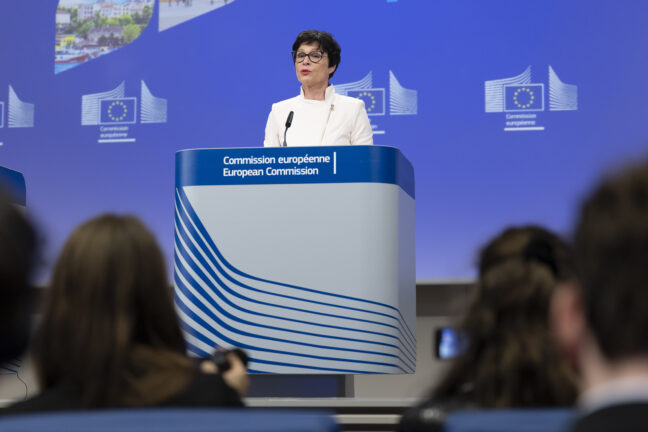The annual assessment of EU candidates’ readiness gave the worst ratings to two countries on the border between Europe and Asia. According to Commissioner Marta Kos, Georgia ’must decide which side it will take’, while in Turkey the absence of the rule of law and judicial independence remain a problem.
“A united continent is the strongest response to those who seek to divide and destabilize Europe.” With these words, Commissioner for Enlargement Marta Kos opened the presentation on the state of the Union’s candidate countries. Among the ten, Georgia and Turkey stand out as the worst performers—two countries that share a common feature, a democratic erosion of their institutions. Another central aspect includes migration management with respect to Ukrainian refugees as well as security in the Mediterranean.
Georgia: Departure from European path
“If you take the EU seriously, then listen to your people and stop imprisoning opposition leaders, journalists, and anyone who thinks differently from you. Then we can talk,” said Ms Kos, addressing the pro-Russian Georgian government. The European Commission has identified a “clear departure from the European path” following Georgia’s decision to suspend its accession process until 2028. Authorities, Brussels notes, have adopted ’repressive’ measures against the opposition, the media, and civil society. According to the Commission “Georgia is effectively abolishing civic participation and checks and balances.”
In Georgia, there is a systematic campaign of anti-European rhetoric, somelaws are incompatible with EU values. – European Commission
The Commission also points to “a systematic campaign of anti-European rhetoric” and laws “incompatible with EU values,” such as the foreign agents law and amendments to the electoral code. Both were deemed by the Venice Commission to contravene international standards.
On democracy and institutions, the report highlights a parliament dominated by the ruling party, which also controls the executive. The 2024 and 2025 elections took place amid intimidation, arrests, and restrictions on observers. The judiciary and prosecution remain under political influence, with no progress on judicial independence or transparency within the High Council of Justice. Human rights violations persist, including excessive use of force against protesters and discrimination targeting LGBTI people and ethnic minorities. The government’s failure to reform the Anti-Corruption Commission and to implement Moneyval and OECD recommendations continues to undermine systemic credibility.
Identity and order ranking high
Data from the December 2024 Caucasus Barometer underscore how Georgia’s democratic legitimacy remains shallow, rooted primarily in identity and order. The political landscape reflects a trust hierarchy that reinforces the ruling Georgian Dream party’s resilience against democratic consolidation. The most trusted institutions are those of order and identity—the army (75.7%), religious institutions (73.2%), and Police (54.4%). In contrast, confidence in representative and oversight bodies remains strikingly low: political parties (11.8%), NGOs and civil society (21.7%), courts (23%), and media (23.5%). Such mistrust erodes democratic accountability and enables ’manipulated constitutionalism’ where executive power weakens checks and balances under the guise of administrative efficiency.
On the contrary, the Foreign Ministry of Georgia’s reply to Brussels “to articulate groundless negative assessments on Georgia and to spread further political speculations”. As the Echo of Caucasus reported, Tbilisi remained “fully committed to the agreements signed with the EU and continues to honour its obligations under the Association Agreement in good faith, with the goal of further aligning the country with the European standards”.
Also the chair of the Georgian Parliament, Shalva Papuashvili, didn’t take in account the European Commission’s overview on his country. He went on to accuse the EU of plotting a coup in Georgia of “financing radicalism and disinformation”, and of attempting to bring the Georgian government under ideological and “political dictate”. Despite that, Mr Papuashvili insisted that Georgia would continue to pursue EU membership “for the Europe that aims to restore European values”. The show (seems) to must go on for the EU pathway of Georgians.
You might be interested
Land of migrants, Russians in transit
Beyond democratic decline, Georgia’s migration dynamics often go unnoticed. A recent report by the European Union Agency for Asylum examines how migratory flows and asylum requests from Georgian citizens have shifted since Russia’s invasion of Ukraine. The broader Black Sea and Eastern European regions have been particularly affected by the war’s disruptions.
Between January and April 2022, Georgian citizens submitted 8,075 asylum applications across the EU and the United Kingdom—a 183% increase compared to the same period in 2021. France (2,725 applications, 34%), Germany (2,455, 30%), and Italy (1,100, 14%) were the main destinations. Flows to Greece declined, while Ireland saw a sharp rise, prompting its government to investigate the underlying causes.
Alongside those leaving Georgia, many Georgians fled Ukraine after the invasion, benefiting—like Ukrainians—from temporary protection. By mid-2020, roughly 65,475 Georgian migrants resided in Ukraine. That year, out of 860,000 Georgian migrants worldwide, 52% (450,000) lived in Russia and about 21% (180,000) in EU countries. Among EU states, Greece (85,065), Germany (25,387), Italy (15,813), Cyprus (15,201), Spain (11,824), and France (8,673) hosted the largest numbers.
While some Georgians left Ukraine, a significant number of Ukrainians moved to Georgia. Between 24 February and 26 July 2022, official data recorded 24,296 Ukrainian refugees in the country.
Georgia also experienced an influx of Russians and Belarusians in the month following Russia’s invasion. Between March and June 2022, 135,000 Russian citizens entered Georgia: a 355% year-on-year increase. Georgia now functions as both a destination and a transit hub for Russians, a trend that could raise concerns in Brussels.
Turkey: Door not closed, migration in focus
Like Georgia, Turkey has also drawn sharp criticism from Brussels. Its EU accession talks remain frozen, as the EU has “serious concerns over the continued deterioration of democratic standards, the rule of law, judicial independence, and respect for fundamental rights have not been addressed,” as stated in the European Commission’s 2025 Enlargement Package.
“The arrests and charges brought against elected officials, opposition figures, political activists, civil society representatives, businesspeople, journalists, and others since early 2025 have raised serious questions about Turkey’s democratic tradition and intensified concerns over judicial independence,” the package continues, also citing the arrests of mayors elected by the largest opposition party, including President Recep Tayyip Erdoğan’s main rival, Istanbul Mayor Ekrem İmamoğlu.
Turkey has rejected and contested the concerns about human rights, democracy, and judicial independence expressed in the European Commission’s annual report on Ankara’s accession to the European Union. “We reject the biased and unfounded allegations regarding the judiciary, fundamental rights, and domestic political developments contained in the report on Turkey by the European Commission,” reads a statement from the Turkish Foreign Ministry. “These comments are not only inconsistent with efforts to establish a positive agenda between Turkey and the EU, but are also written in language that runs counter to the long-term interests of both sides,” the statement reads, which also criticizes the parts relating to the Cyprus issue.
EU has serious concerns over the continued deterioration of democratic standards in Turkey, the rule of law, judicial independence, and respect for fundamental rights. — EU’s 2025 Enlargement Package
Still, “both the EU and Turkey are pursuing renewed engagement in areas of mutual interest,” in line with the recommendations of the 2023 Joint Communication on EU-Turkey Relations and subsequent European Council Conclusions. The Commission underlines that “the EU is re-engaging with Turkey in a constructive, gradual, proportionate, and reversible manner,” conditioned above all on Ankara’s “increasingly active and multilayered foreign policy” and its recent improvement in relations with Athens.
An important strategic partner
An official candidate since 2005, Turkey remains for the EU “a strategic objective,” while the negotiation process has been effectively frozen since 2018, also for the strategic role that Ankara has in the Mediterranean sea.
Growing geopolitical challenges have reinforced Turkey’s strategic role in the region notably regarding developments in Syria, Ukraine, Gaza, and the South Caucasus, as well as migration and asylum management. Brussels remains acutely aware of the importance of maintaining cooperation with Ankara on these matters. In fact, Turkey “sustained efforts to host 2.7 million refugees including Syrians under temporary protection” and reveals “some progress in further strengthening the capacity to survey and protect it”, said an European Commission official.
According to the latest International Organization for Migration’s report (March 2025) and data from the Turkish Presidency of Migration Management (PMM), Turkey hosts over 4.1 million foreigners, of whom 3 million are seeking international protection. The vast majority are Syrians (2,797,292) under temporary protection. Others, mainly from Iraq, Afghanistan, Iran, and Ukraine, hold international protection status.











